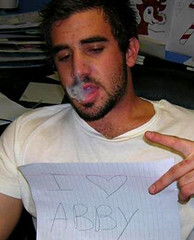When most people think of consequences associated to youth and social media (MySpace, Facebook, and blogs), the first thought that comes to mind is sexual predators infiltrating the Web. Yet, most consequences seem more subtle, despite growing out of a spoof about society’s fascination with addictive behaviors.
Sure, Dr. Ivan Goldberg may have coined the phrase “Internet Addiction Disorder” as satire but other researchers like clinical psychologist Kimberly Young, Psy.D. used it to set a new pace in launching exploratory studies that looked at online addiction (read a sum up here). In one such study, she concluded as many as 396 of the 496 Internet users could be classified as dependent.
More recently however, John Grohol, Psy.D. pointed out that most of these studies are less than reliable. In fact, many skew toward proving a threat to modern society. And others, such as the impact of Internet harassment, seem too thin to draw any real conclusions.
So maybe we need better questions: What are the long-term personal ramifications of participation in these networks, particularly among youth, as Marc Aniballi, managing director at Crack Method, offered up to me on Linkedin as one question we don't ask enough about social media.
Although I am not deep enough into the book Social Intelligence to provide a proper review, I do believe Goleman has set the stage to answer questions like the one proposed by Aniballi. Some paraphrased highlights from the book include: substituting daily interactions with online activities may not provide children enough experience to cope with face-to-face interactions; constant digital connectivity may inadvertently disconnect them from the world around them; greater connections may provide more forums to justify anti-social behavior rather than reinforce moral values being taught at home; and emotional outbursts online that may spill over into their surrounding environment.
They are interesting observations. They make me wonder if some answers are right under our noses. Maybe Britney Spears, Lindsay Lohan, and Jason Wahler have the answers.
All of them were subjected to an inordinate amount of adult content and choices, a displaced sense of self-worth as it is based on public input, a disproportionate amount of public critique and ridicule, an inappropriately high level of aggressive public outbursts, and a general disconnect from interacting with the world around them; experiences that are indicative of social networks and the Internet.
So where does that leave us? As much as I would like to say that the solution is simply better educating youth before giving them the freedom to engage in social media, I sometimes wonder if most adults understand that one of the personal and professional consequences of engagement means becoming a semi-public or public figure. Nonetheless, here are three observations that youth might benefit from before becoming more immersed in social media:
Balance. Social media is best used to augment education, expand social networks, and create conversations. It was never meant to replace them or infringe upon them. Forget friend counts and get out more.
Responsibility. Written communication has significantly more impact than verbal communication. It is often permanent. Despite this, social media dramas are generally more inflammatory than in-person disagreements and discussions. Diffuse it instead of lending to it by insulating yourself against becoming emotionally engaged. In most cases, name callers say more about themselves than the person they attack. In some cases, they aren’t even real people.
Selectivity. Unless we can look at the world as disconnected observers, information can and will influence our behavior. It pays to be selective in what we expose ourselves to, how we interpret that information, and to take care not to project it into our own lives.
To be clear, I think social media is one of the finest communication tools available for any number of individual and business applications. However, the Internet is much like the world: you can find what you look for. So what are you looking for? And your kids?














2 comments:
Famous Last Words:
"When you make a presentation to a hiring manager you want to be in control of that presentation.
But you can't control access to your blog. So should you restrict its content to material you would be happy to produce in a job interview?" – Recruiting Animal, in a great semi-related post.
Even more words:
"So how many advertisers pulled ads on MySpace after the revelation that 29,000 known sex offenders (4 times the original estimate) had profiles on the social media site, ostensibly to prey on young victims? The answer would be zero. MySpace deleted all those profiles ..." — AdGeek.typepad.com
Post a Comment